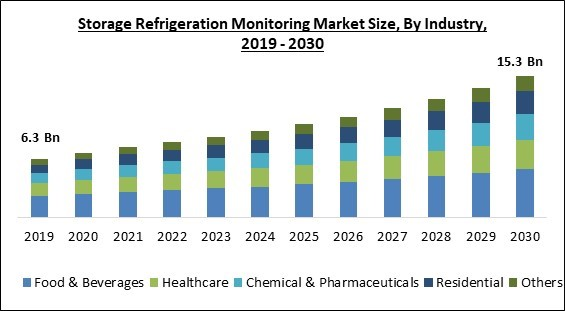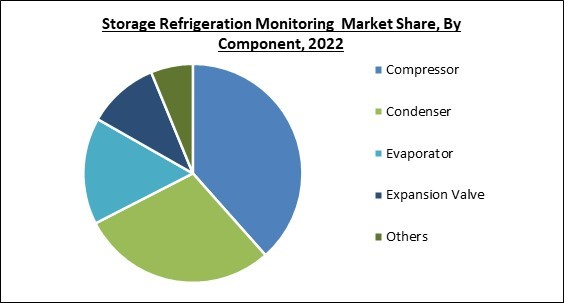Dairy and ice cream products are extremely perishable and highly susceptible to temperature changes. Hence, Dairy and ice cream segment would capture approximately 1/5th share of the market by 2030. Such goods are stored at the proper temperatures, maintaining their freshness, taste, and texture, owing to proper refrigeration monitoring. It aids in stopping bacterial development, spoilage, and other problems that can jeopardize the security of the goods. Businesses can spot possible problems with refrigeration systems quickly with real-time temperature monitoring and notifications. Quick action can stop product degradation or spoiling, which ultimately saves money and cuts down on waste. Some of the factors impacting the market are raising awareness of food quality and safety among consumers, heightened awareness of energy efficiency in relation to cold storage facilities, and lack of established protocols.
Consumers are becoming more knowledgeable about the possible dangers of storing food improperly, such as bacterial development, deterioration, and contamination. Businesses may ensure compliance with rules and stay out of trouble by putting these measures in place. As consumer awareness of food safety continues to rise, it is essential for food producers, distributors, and retailers to adopt storage refrigeration monitoring systems to meet consumer expectations, uphold the brand reputation, adhere to regulations, guarantee transparency, and make wise business decisions. Therefore, all these aforementioned factors are expected to propel the growth of the market in the coming years. Companies have prioritized energy-efficient choices to lower costs and lessen their environmental impact as a result of these facilities' substantial energy use of refrigeration systems. Solutions for monitoring storage refrigeration that provide information on energy use and optimization have become more valuable. Businesses may improve their cooling procedures, lower equipment downtime, and increase the usefulness of their refrigeration systems by utilizing advanced analytics along with machine learning algorithms, which is expected to create excellent market opportunities.
However, compatibility problems between various monitoring systems may arise in the lack of global standards or protocols. Data integration and exchange may be challenging due to the usage of particular formats and protocols by each machine. Because of this, it may be difficult for enterprises to work with various stakeholders or implement complete monitoring solutions incorporating several systems. The ability to gain important insights or adopt consistent analytical processes is hampered by the heterogeneity in data collecting and storage techniques. During the forecast period, these factors will negatively impact the market share for storage refrigeration monitoring.
Industry Outlook
Based on industry, the market is segmented into food & beverages, chemical & pharmaceuticals, healthcare, residential, and others. The chemical and pharmaceuticals segment recorded a substantial revenue share in the market in 2022. In the upcoming years, the pharmaceutical sector is anticipated to expand dramatically. To ensure the secure transportation and storage of medications, increased global demand requires strict regulatory standards. The temperature of pharmaceuticals and medications that are temperature-sensitive must be maintained and administered at a steady level.Application Outlook
By storage application, the market is divided into fresh fruits & vegetables, beverages, dairy & ice cream, meat, medical & pharmaceutical products, and others. The fresh fruits and vegetables segment witnessed the maximum revenue share in the market in 2022. Since fresh fruits and vegetables need to be chilled for maintenance purposes, the segment is expanding as a result of the significant usage of refrigeration systems in this application. Additionally, it is anticipated that the category will develop as a result of the significant use of refrigeration systems by a number of industries involved in food processing.Component Outlook
On the basis of component, the market is classified into condenser, compressor, evaporator, expansion valve, and others. The condenser segment recorded a significant revenue share in the market in 2022. The data points or characteristics that a compressor driver monitors and controls are referred to as the condenser in a refrigeration system. These factors support controlling and improving the compressor's operation. The specifics may vary depending on the complexity and kind of compressor as well as the requirements of the refrigeration system.System Type Outlook
Based on system type, the market is characterized into software, hardware, and services. The hardware segment garnered the highest revenue share in the market in 2022. To accurately verify the temperature of the storage refrigeration systems, hardware systems such as RFID devices, sensors for temperature and pressure, networking devices, and others are used. Hardware, which includes defrosting sensors, touch sensors, and liquid level sensors, as well as networking devices that monitor and control the refrigeration system and alert the user via alarms or notifications, is a crucial part of refrigeration monitoring units.Regional Outlook
Region wise, the market is analyzed across North America, Europe, Asia Pacific, and LAMEA. The North America segment witnessed the largest revenue share in the market in 2022. The expansion of cold chain facilities and the requirement for monitoring systems are predicted to be facilitated by improvements in storage and distribution networks. The government's investments in creating more effective and cutting-edge cold chain monitoring and tracking systems to boost supply chain efficiency and productivity are anticipated to fuel market expansion in this region.The market research report covers the analysis of key stakeholders of the market. Key companies profiled in the report include Carrier Global Corporation (Sensitech, Inc.), Raytheon Technologies Corporation, Evapco, Inc., The Danfoss Group, Daikin Industries Ltd., Emerson Electric Co., GEA Group AG, Ingersroll Rand, Inc., Johnson Controls International PLC, Mayekawa Mfg. Co., Ltd.
Strategies Deployed in the Market
- Jul-2023: AirReps, a subsidiary of Daikin Comfort Technologies North America, Inc. owned by Daikin Industries Ltd. completed the acquisition of Integrated Systems and Controls, LLC, an OEM startup, and InControl, an offerer of controls and energy management products. This acquisition would further support Daikin Industries Ltd in association with AirReps to encounter the commercial market’s requirement for integrated services.
- Jun-2023: The Danfoss Group expanded collaboration with ANEO Retail, a multi-national engineering group. Under this collaboration, both companies would integrate the best-in-class controls and IoT services of Danfoss and the proven project management and service management expertise of ANEO Retail to offer innovative energy service solutions to the food retail industry in Denmark.
- Jun-2023: Johnson Controls International PLC acquired M&M Carnot, a leading provider of natural refrigeration solutions. This acquisition aims to assist clients in achieving their sustainability objectives while exceeding environmental regulations.
- Mar-2023: The Danfoss Group acquired BOCK GmbH, a world leader in CO₂ and low-GWP compressors. This acquisition would strengthen Danfoss’ position as a favorable offerer of greener cooling and heating solutions.
- Feb-2023: The Danfoss Group came into partnership with Lizard Monitoring, a temperature and location monitoring solutions provider. This partnership aimed to support North American retailers to avoid food loss. Additionally, Lizard’s sensor networks support Danfoss’ Alsense monitoring portfolio to protect uninterrupted temperature monitoring and give store managers and food safety chiefs a detailed understanding of environmental compliance and refrigeration performance.
- Feb-2023: Daikin Germany, a subsidiary of Daikin Industries Ltd. introduced a CO2-ZEAS, a new inverter-controlled refrigeration condensing unit. The launched product would utilize Daikin’s double swing compressor that would be specifically designed for CO2 along an isentropic efficiency of 69.5%.
- Jan-2023: The Danfoss Group collaborated with Salling Group, an operator of a retail chain of departmental stores, and Microsoft Corporation, an American multinational technology company. The collaboration aims to strengthen sustainable food retail along with digitization. Through this collaboration, companies would create best-in-class digital services to track energy utilization and temperature of supermarket refrigeration, allowing preventative maintenance to prevent energy waste and food losses.
- Jun-2022: Evapco, Inc. acquired Select Technologies, a manufacturer of automation machinery. This acquisition aimed to form Evapco Select Technologies that would support in widening market demand for sophisticated control systems for cold storage and food processing facilities to improve system reliability and optimize performance.
- Mar-2022: The Danfoss Group came into partnership with Ohmia Retail International AS, a company that specializes in providing energy management solutions. Under this partnership, both companies would create a joint venture in Sweden known as Ohmia Retail Sweden AB. Additionally, both companies would enable the food retail market to have the most energy-saving refrigeration systems and enhanced operations.
- Feb-2022: Evapco, Inc. took over Systèmes LMP, a Canada-based CO2 refrigeration systems manufacturer. This acquisition would assist Evapco in supplying the market's increasing demand for natural refrigerants and environmentally friendly refrigeration systems.
- Jan-2021: Daikin North America LLC, a subsidiary of Daikin Industries, Ltd. came into partnership with ABCO HVACR Supply + Solutions, the leading full-line distributor of HVAC and refrigeration systems. Additionally, Daikin's extensive line of equipment, components, and accessories benefit from ABCO's distinctive combination of everyday air conditioning and refrigeration application engineering and its knowledge in commercial and residential sales.
- Jul-2020: Johnson Controls International PLC unveiled the PENN Connected Digital Food Safety Compliance Management System. Additionally, the digital compliance management solution would contain data monitoring, reporting, and recording which would guarantee the food would be kept, cooked, and eaten safely.
Scope of the Study
Market Segments Covered in the Report:
By Industry
- Food & Beverages
- Healthcare
- Chemical & Pharmaceuticals
- Residential
- Others
By Application
- Fresh Fruits & Vegetables
- Beverages
- Medical & Pharmaceutical Products
- Dairy & Icecream
- Meat
- Others
By Component
- Compressor
- Condenser
- Evaporator
- Expansion Valve
- Others
By System Type
- Software
- Hardware
- Services
By Geography
- North America
- US
- Canada
- Mexico
- Rest of North America
- Europe
- Germany
- UK
- France
- Russia
- Spain
- Italy
- Rest of Europe
- Asia Pacific
- China
- Japan
- India
- South Korea
- Singapore
- Malaysia
- Rest of Asia Pacific
- LAMEA
- Brazil
- Argentina
- UAE
- Saudi Arabia
- South Africa
- Nigeria
- Rest of LAMEA
Key Market Players
List of Companies Profiled in the Report:
- Carrier Global Corporation (Sensitech, Inc.)
- Raytheon Technologies Corporation
- Evapco, Inc.
- The Danfoss Group
- Daikin Industries Ltd.
- Emerson Electric Co.
- GEA Group AG
- Ingersroll Rand, Inc.
- Johnson Controls International PLC
- Mayekawa Mfg. Co., Ltd.
Unique Offerings
- Exhaustive coverage
- The highest number of Market tables and figures
- Subscription-based model available
- Guaranteed best price
- Assured post sales research support with 10% customization free
Table of Contents
Companies Mentioned
- Carrier Global Corporation (Sensitech, Inc.)
- Raytheon Technologies Corporation
- Evapco, Inc.
- The Danfoss Group
- Daikin Industries Ltd.
- Emerson Electric Co.
- GEA Group AG
- Ingersroll Rand, Inc.
- Johnson Controls International PLC
- Mayekawa Mfg. Co., Ltd.










